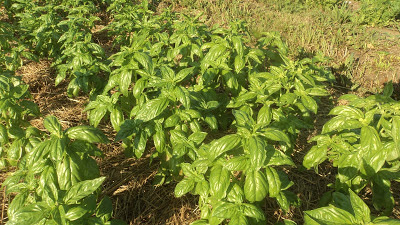BASIL (F/P) Welcome summer in with the flavor of the season.
CARROTS (F/P) This first week we give them to you freshly-pulled with their tops. Cut off the tops, leaving an inch green stub if you want to store them for later use.
LETTUCE (F) Summer lettuces are smaller and crunchier, that’s how they survive the heat.
KOHLRABI (F/P) Peel it well, steam lightly and season with fresh herbs, salt and oil. Yum!
SUGARSNAP PEAS (F/P) Last week of these babies. They are less sweet now and hold up well to a little cooking.
SUMMER SQUASH (F) It is the first harvest and we just have one or two for the full shares. There will be much more to come.
SWEET PEPPERS (F/P) There is an assortment of colors to choose from but they are all green, i.e. unripe, peppers. It is good for the plants to be pruned of some of their fruit when they are young. This encourages the plant to grow bigger with more leaves to shade the fruit.
CHARD OR KALE (F/P) May be the last time we will have it for awhile, so enjoy its many benefits.
BUNCHING ONIONS (F) Tiny bugs called thrips have been nibbling our onions, hence their pale color.
NEXT WEEK: More squash, beets and cabbage. Cucumbers hopefully and maybe the first little tomatoes.
FARM REPORT: As of tonight we are still trying to decide what row of carrots to harvest. We grow several varieties in the Spring, some of which sweeten in storage. We may pick some of the smaller carrots that are more tender. Here’s a photo we took over a week ago of our choices.
A family of barn swallows has lived in the shed across the road since Tom and I returned to the farm ten years ago. They used to live in our barn, but we must have scared them off with the commotion of the clean-up efforts. Our nearest neighbors, the swallows were close by enough to continue to hunt bugs in our fields on summer evenings. They are especially drawn to the sound of the tractor and will swoop and dive around Tom’s head as he mows the fields – picking up bugs as they scatter out of the tractor’s path. I counted eight swallows today perched together waiting to do another run.
I think I’d rather by a barn swallow and make my nest (1,000 mouthfuls of mud, according to our Birds of Missouri book) under a roof rather than the bird that made her nest directly on the ground in the squash patch. We rarely see a good result from a nest on the ground in our fields, but it sure is sweet.


